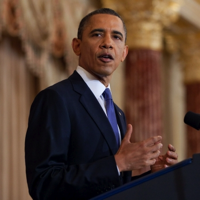Much of the reaction to President Barack Obama's speech on U.S. Middle East policy last Thursday focused on his reference to Israel's pre-1967 borders as the basis for a future two-state solution with Palestine. But Obama's speech was far more focused on long-term realities, suggesting that he is not really willing to push for some historic Israeli-Palestinian peace plan against the background of the Arab Spring. In fact, it's fair to wonder why he chose to expend any of his political capital on this deadlocked issue, especially since he had to know that Israeli Prime Minister Benjamin Netanyahu would reject the 1967 boundaries proposal as a starting point for negotiations, as Netanyahu had already protested that point's inclusion in the speech prior to its delivery.
Now, despite having walked back his criticisms of the speech over the weekend, Netanyahu's ice-cold visit to the White House on Friday becomes the historical coda to what was billed as a framing speech for the region as a whole. That's too bad, because it was actually a tremendous speech, full of what I would call "developmental realism." Not only did Obama eschew any direct promises of toppling leaders, he coupled a passive-tense treatment of American leadership with a clear repudiation of the notion that elections alone can bring "real reform." Thus he spent the bulk of his speech listing all the vast social reforms -- freedom of religion, women's rights -- that must undergird political change, while stating unequivocally that all such transformations are unsustainable absent broadband economic development.
In short, Obama's speech made clear just how much the Israeli-Palestinian conflict is a complete sideshow to the civilizational rebirth triggered by the Arab Spring, which is about the Arab world finally adapting itself realistically to the demands imposed by globalization's creeping embrace: If you want to do real business in this world, achieving the sort of investment and production-chain integration that generates serious job creation, you must engage with all comers regardless of race or creed. Regarding women, the reality of every economic "miracle" of the last several decades is that they all began when societies allowed women to join the workforce en masse. There's your "inscrutable" secret of Asia's rise.

